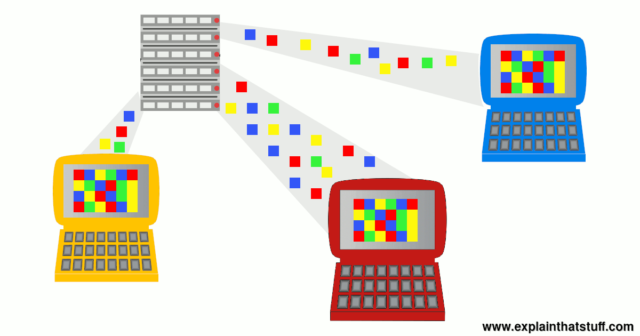When it comes to watching TV shows, movies, news, or sports, people love the TV experience. But nowadays, thanks to the advancement of different technologies, there are different mediums via which you can get that experience – two of the most widely popular ones being satellite TV and streaming TV services.
There are multiple providers and platforms out there offering satellite TV and streaming TV services. The common providers of satellite TV in the United States include DIRECTV and DISHTV. Whereas, Sling TV, Hulu + Live TV, Paramount+, Xumo, and Peacock are all platforms that offer live TV streaming services.
Satellite TV has been around for quite some time now. The basic mechanics are that a satellite dish placed in your home transmits the signals it receives from the satellite in space. These signals are then sent to the satellite box, which converts them into audio and video outputs. On the other hand, streaming TV services are relatively new technology. It is powered by the internet and no special equipment is required.
Both services have their pros and cons, but to decide which one is best for you, you need to look at some key differences between them. So, let’s dive right into it.
Price
When it comes to the price, streaming TV services are cheaper than satellite TV, but that is only when a user is subscribing to one streaming platform. Most people subscribe to multiple streaming services to view a variety of content. If you do that, you will likely be paying as much or even more than what you would for a satellite TV subscription.
Programming
Streaming services usually do not offer a wide range of content. There are a limited number of shows that you can watch, and that too can change if the streaming service decides to terminate the contract with those said shows. And given that some streaming platforms, like Amazon Prime and Netflix, produce their own content from time to time, to view all that content users may need to subscribe to multiple platforms. Whereas satellite TV providers offer a wide range of channels. That means you get a lot of content to view from a single subscription.
However, to see what kind of content you’ll be getting access to, go through the channels line-up of the satellite TV provider. For instance, the DISH TV Guide will help you determine whether you should subscribe to that particular service.
Video Quality
Satellite TV providers offer most channels in HD and 4K resolution. Meanwhile, to watch content in HD quality on streaming platforms you need access to a high-speed internet connection. Streaming services would also consume a lot of your data in case you have subscribed to an internet service that imposes data caps.
Flexibility
Satellite TV services are relatively less flexible as compared to streaming TV services. When you subscribe to satellite TV, you only get access to the content that is offered by that particular provider. But. you can subscribe to multiple streaming platforms, each offering a different selection of content, some even from basic TV.
Convenience
A streaming platform is more convenient as you don’t need to install a bunch of equipment to get access to a variety of content. All you need to have is a reliable and high-speed internet connection to view different TV shows, movies, and live sports. Streaming services require you to install a receiver box and dish and the provider will also charge you the installation fee.
Final Note
To decide which service is better you need to know what exactly you are looking for. If price is your main concern, then streaming TV services may be a better option for you but if you are looking for range and diversity in the content, you should opt for a satellite TV service.








